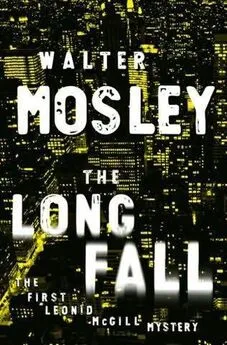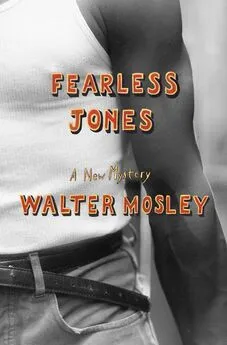Walter Mosley - The Last Days of Ptolemy Grey
- Название:The Last Days of Ptolemy Grey
- Автор:
- Жанр:
- Издательство:неизвестно
- Год:неизвестен
- ISBN:нет данных
- Рейтинг:
- Избранное:Добавить в избранное
-
Отзывы:
-
Ваша оценка:
Walter Mosley - The Last Days of Ptolemy Grey краткое содержание
The Last Days of Ptolemy Grey - читать онлайн бесплатно полную версию (весь текст целиком)
Интервал:
Закладка:
Don’t let the cops get you in jail, Coydog McCann used to tell him on the porch of his tarpaper house down in Mississippi, in Breland, when Ptolemy was seven and the skies were so blue that they made you laugh. Don’t evah let a niggah go to jail because’a you, Coydog had said. Be bettah to shoot a niggah than turn him ovah to John Bull.
“My grandson, Reggie, Officer. My grandson. He takin’ me to the People’s Bank an’ to the sto’.”
“Why does he have your wallet?” the dark-skinned cop asked.
“He wanted to tell where we was, where it was, you know. Where it was.”
“Are you his grandson?” the cop asked Hilly.
“His nephew, Officer,” Hilly said in a respectful voice that he had not used before. “He calls me Reggie, who’s my first cousin, but I’m Hilly Brown, and Reggie the one usually take care of him. I was lookin’ in his wallet because he done forgot the address of his bank.”
Ptolemy studied the police as they watched his nephew.
Hilly was his great-grandnephew, he remembered now. He was smaller the last time they’d seen each other. It was at a party in somebody’s backyard and there was brown smog at the edges of the sky but people were still laughing.
“Are you okay, sir?” the white cop asked Ptolemy.
“Yes, Officer. I’m fine. Reggie here, I mean Hilly here, was protectin’ me from all the thieves in the streets. He takin’ me to the bank and the food store. Yes, sir.”
The four men stood there on the dirty street for half a minute more. Ptolemy caught the smell of maggots from a nearby trash can. There was danger in the air. Ptolemy thought about Lee Minter, whom he saw run down and beaten by a cop name Reese Loman and his partner, Sam. The cops had truncheons. After the beating, Lee lay up in a poor bed in a tin house, where he died talking to his baby, LeRoy, who had passed ten years before. Lee called the cops fools for trying to arrest him for something they knew he didn’t do, and then he ran. The dying man had a fever so hot that you didn’t even need to touch him to feel the heat.
The policemen said something to Hilly. Ptolemy heard the deep voices but could not make out the words.
“Yes, Officer,” Hilly said to the white cop.
Ptolemy remembered that you were always supposed to speak to the white cop. Sometimes they had black men in uniform but it was the white cop that you had to talk to.
“Come on, Papa Grey,” Hilly said after the policemen got in their car and drove off. “We got to get to the bank before they close.”
It was a long, crowded room with a high counter down the middle and another one against the window that looked out on the street. Opposite the picture window was a wall of glass-encased booths where women cashed people’s checks and took deposit money for their Christmas clubs. Ptolemy used to keep a Christmas club for Angelina, Reggie’s daughter . . . or maybe it was William’s daughter, yes, William’s daughter, Angelina. And he also kept a holiday account for Pecora, even though she never liked him very much.
There were too many people in there. Ptolemy tried to see them but they began to blend together and no matter how many times he saw somebody when he looked around no one was familiar to him. And so he kept moving his head, trying to see and remember everyone.
“Let’s go to the counter, Papa Grey.” Hilly took his arm but Ptolemy wouldn’t budge. He just kept looking around, trying to make all of those faces make sense.
“Don’t it bother you?” the older man asked the younger.
“What? Come on.”
Ptolemy wasn’t going to be pulled around until he could make sense of that room. It seemed very important, almost as much as protecting that boy from the bulls. Didn’t he know that you weren’t ever supposed to take out your wallet on a street? If the thieves didn’t get you the police certainly would. The young people didn’t seem to have any sense anymore. They didn’t know. All the people on line and at the counters didn’t know what to do, and so it was dangerous on the street.
“Come on, Uncle.”
One man wearing a bright-blue suit with a long double-breasted jacket stood there talking to a blond-headed black woman who was smiling and wore no wedding ring. The blue-suited man looked very much like the gangster Sweet Billy Madges, and she, blondie, was familiar too. But it wasn’t anything to do with Madges and his whores. The blond black woman was like Letta Golding, who lived in a room across the courtyard from which a great oak had arisen.
“That oak,” Coydog would say, “is like Christ a’mighty coming up outta the clay, fed by the graves of all the dead souls that believed in him.”
“Do you believe in him?” Li’l Pea asked.
“If things goin’ good,” the wizened old man opined, “not too much. But when I’m in trouble I can pray with the best of ’em.”
If he was small enough, a little boy could climb on the limbs of that tree and clear across the courtyard or up or down to the walkways of any of the eight floors of that Mississippi Negro tenement.
Coydog lived there for a while, and Li’l Pea would visit him whenever he could.
“Papa Grey,” Hilly beseeched.
Letta was beautiful and friendly. Li’l Pea often found himself climbing up to the seventh-floor window of her apartment because she never pulled down the shade; even if she was naked and in the barrel she used for a bathtub, Letta would stand up and smile for Ptolemy and touch his cheek or kiss his forehead.
“You a nasty boy,” she’d say if he came up to her window and she was naked but she’d be smiling and he knew that she wasn’t really mad.
“Papa Grey,” Hilly said again.
“What?”
“Do you have a check to cash?”
He was still standing in the crowded bank and not in Letta’s bathroom. This realization was a surprise for the elder Grey but not a shock. He was used to going places in his mind. More and more he was in the past. Sometimes with his first wife, Bertie, and then later with the woman he truly loved—Sensia Howard. Even when she had been untrue to him with his good friend Ivan, he couldn’t get up the strength to leave Sensia—or to kill her.
The next thing Ptolemy knew he was standing at the counter with the three checks for $211.41 in his hand. Hilly was getting him to sign on the back over some other words that the boy had written.
“You stay here, Papa Grey,” Hilly was saying. “I’ma go over to the teller and get your money.”
Hilly had the checks in his hand but Ptolemy did not remember handing them over. He had signed them and now the boy was on the other side of the dividing table, standing on line at a teller’s window.
“That your son?” a woman asked.
She was old but not nearly as old as Ptolemy. Maybe sixty, maybe seventy, but he had twenty years on her at least.
“No. His name is . . . I forget his name but he’s my nephew, either my sister’s son or her daughter’s son. Somethin’ like that.”
“Oh,” the short woman said. “Mister, can you help me?”
“Um, the boy there does most everything for me,” he replied, thinking that he should go over on line and stand with, with . . . Hilly.
“I need five dollars more to make my telephone bill,” the woman said. She wore blue jeans and a pink T-shirt, black-and-white tennis shoes, and a cap with a long transparent green sun visor.
“I don’t take care’a the money,” Ptolemy said. “I let the boy do that. I can’t hardly see the fingers on my hand and so he count the money so I don’t give ya a one instead of a, of a five.”
The woman was the same height as he. She once had clear brown eyes that were now partly occluded with wisps of gray.
“My name’s Shirley,” she said.
“Ptolemy,” he said, “but they call me Li’l Pea.”
“What kinda name is that?”
“It was Cleopatra’s father’s name,” the old man said. He had said the words so often in his life that they came to his lips automatically. He didn’t even know if they were true because it was Coydog told him that and his mother had said, “That Coydog just as soon lie as open his mouf.”
“The queen of Africa?”
“What’s your last name, Shirley?”
“Wring,” she said with a smile. “Double-u ara eye en gee.”
“Double-u ara eye en gee,” Li’l Pea, Pity, Petey, Ptolemy Grey repeated.
The woman smiled and lifted her left hand, which held the leather straps of a faded cherry-red purse. She placed the bag on the counter and took out a smaller black velvet bag. From this she took a piece of pink tissue paper, which held a lovely golden ring sporting a large, dome-shaped pale-green stone.
“Emerald,” Shirley Wring said, placing the delicate jewel on his upturned fingers. “You can hold on to it until I get my Social Security an’ then I can buy it back for six dollars.”
Ptolemy stared into the sea-green crystal, admiring the flashes of white and yellow from the inner variations as it tumbled between his fingers.
A treasure, he thought. Glee set off in his chest, like the sunlight through the window ignited the jewel in his hand; he felt delight at the reward that Shirley double-u ara eye en gee delivered to him even though they were strangers. He experienced a deep satisfaction in the pleasure of her trust in him. He thought about Letta carrying him in through the window and tolerating his presence while she dressed and put on the red lipstick that her boyfriends paid for so dearly.
The excitement became a pain in his chest. Ptolemy, now gazing into the cloudy-eyed woman’s brown face, understood that these feelings were strong enough to kill.
He smiled broadly then and said, “Girl, you a beam’a sunshine at the end of a long day of rain.”
He put the ring in his pocket. Shirley stared at him, smiling hopefully.
Hilly came up to them then.
“Okay, Papa Grey,” he said. “Let’s go.”
“Gimme my money,” Ptolemy said.
“Later . . . at the sto’.”
“Now,” the old man commanded, “right here in this room.”
Hilly handed his great-uncle a paper envelope filled with bills in small denominations.
“This is Shirley Wring,” Ptolemy said. “Double-u ara eye en gee.”
He was no longer looking around the room, wondering at the changing faces. Ptolemy spread the envelope open and took out a ten-dollar bill. He gave the money to the woman and then took the emerald ring from his pocket.
“Will you take this gift from me, Shirley double-u ara eye en gee?”
Hilly moved his big, heavy head back and forth with a perplexed twist to his face. Shirley smiled. Ptolemy lifted the ring higher.
“You’re a sweet man, Li’l Pea,” she said, taking her collateral and squeezing it between gnarled fingers.
She put the emerald in its tissue and placed the pink paper in her velvet bag. Then she put the black velvet sack into the faded red-leather purse. Shirley Wring made a movement that was the start of a curtsy and then shuffled off to get on line to pay her phone bill.
“She a friend’a yours?” Hilly asked.
“That’s a woman there, boy,” Ptolemy replied, thinking about Coydog talking to him when he was young and didn’t know a thing.
“Wanna go to the store now?” Hilly suggested, putting his hand on his uncle’s shoulder.
“What’s your hurry?” Ptolemy asked.
“Nuthin’. We just gotta go.”
They went to Big City Food Mart and filled a plastic basket with bologna, store brand Oat Ohs, margarine, sour pickles, a bag of mini peanut butter cups, peanut butter, rye bread, orange juice, Big City brand instant coffee and creamer, and six ripe red apples. The total at the cashier came to $32.37. When they got out of line Ptolemy counted the money he had left: $169.04. He counted it three times and was starting on the fourth when Hilly said, “Come on, Papa Grey, we gotta take these things home.”
Читать дальшеИнтервал:
Закладка:






![Джеймс Купер - Последний из могикан, или Повествование о 1757 годе [The Last Of The Mohicans]](/books/1067513/dzhejms-kuper-poslednij-iz-mogikan-ili-povestvovan.webp)
![О Генри - Последний лист [The Last Leaf]](/books/1074386/o-genri-poslednij-list-the-last-leaf.webp)

